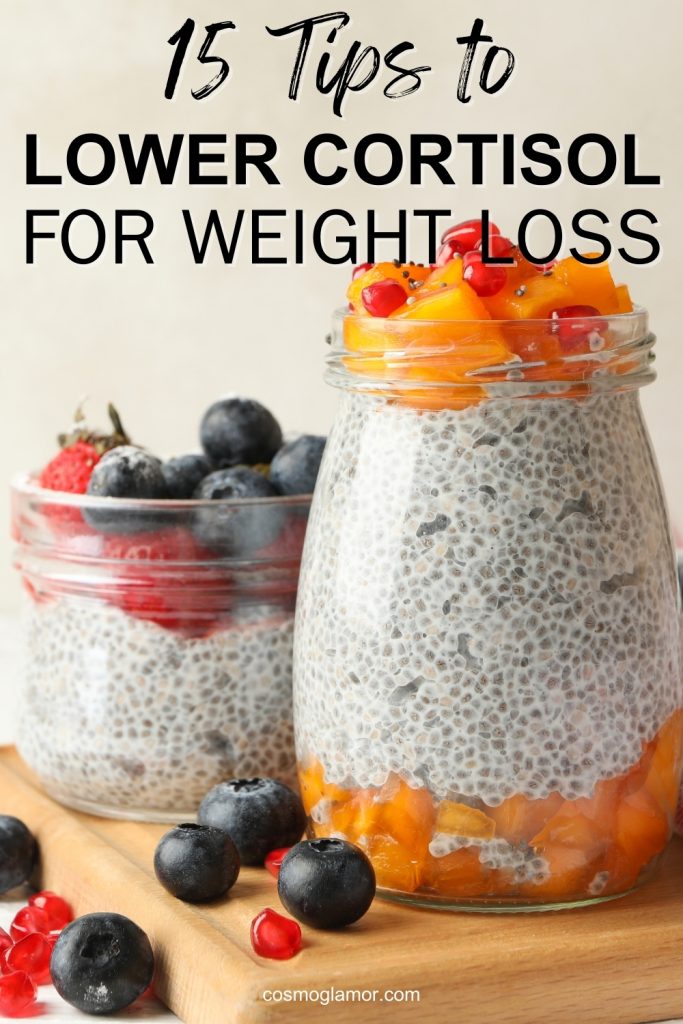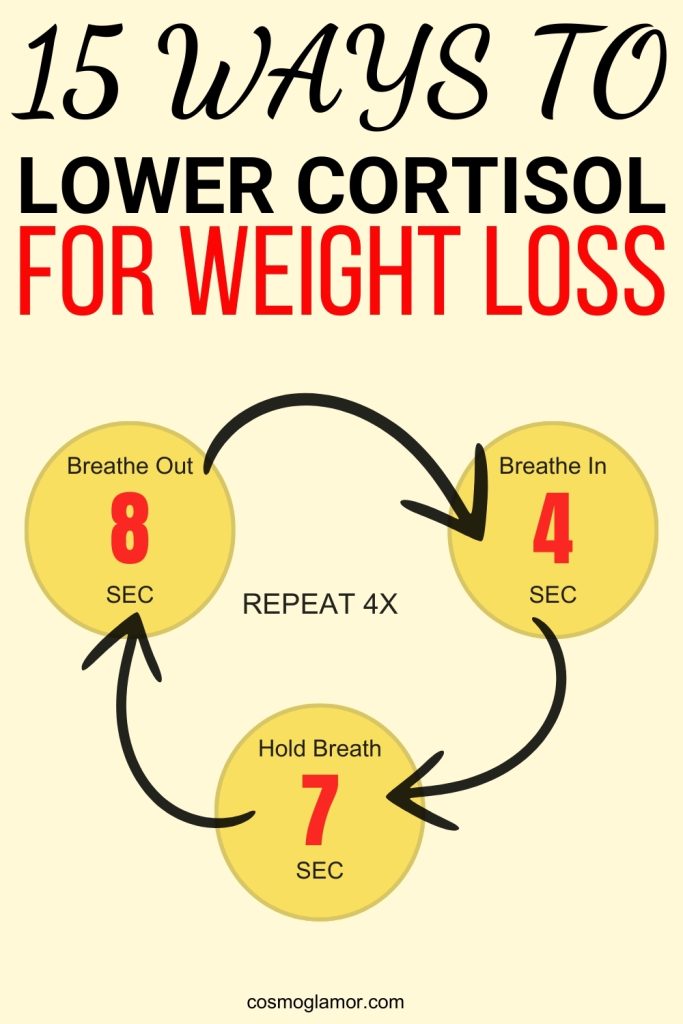Feeling overwhelmed? Struggling with sleep? That spare tire around your waist just won't budge? You might be dealing with high cortisol, the notorious “stress hormone.” But don't worry! Taking control is easier than you think. This isn't your average cortisol guide. We're diving deep into 15 actionable tips to help you naturally reduce cortisol and reclaim your well-being, with quick wins and practical advice that fits into your busy life. So, take a deep breath, and let's embark on this journey to a calmer, healthier you!
Understanding Cortisol: Your Body's Built-In Alarm System

Think of cortisol as your body's natural alarm system. It's a hormone produced by your adrenal glands, and it's essential for life. It helps regulate your metabolism, immune system, and blood sugar levels. It's also crucial in helping you respond to stress. When you face a perceived threat, your body kicks into “fight-or-flight” mode, releasing a surge of cortisol to give you the energy you need to either confront the danger or flee from it. This response is incredibly useful in short bursts, such as when you need to react quickly to avoid an accident.
The Problem with Chronic Stress

In short bursts, cortisol is a lifesaver. It's designed to help you survive immediate threats. But in today's fast-paced world, many of us are constantly bombarded with stressors, leading to chronically elevated cortisol levels. This is where the trouble starts. Unlike acute stress, which is temporary, chronic stress keeps your body in a prolonged state of alert, which can wreak havoc on your physical and mental health.
Signs Your Cortisol Might Be Out of Whack
- Sleep struggles: Insomnia or waking up feeling unrested, even after a full night's sleep. You might find yourself tossing and turning, unable to quiet your racing thoughts.
- Brain fog: Difficulty concentrating, remembering things, or making decisions. It might feel like your brain is filled with cotton wool.
- Mood swings: Feeling irritable, anxious, or down in the dumps. You might experience sudden bursts of anger or find yourself feeling overwhelmed by even minor challenges.
- Weight gain: Especially stubborn belly fat that's resistant to diet and exercise. This is because cortisol can increase your appetite and promote fat storage, particularly around your midsection.
- Constant fatigue: Feeling tired even after a full night's sleep. You might feel like you're dragging yourself through the day, lacking the energy to do the things you enjoy.
- Digestive issues: Bloating, constipation, or diarrhea. Stress can disrupt your gut microbiome and interfere with healthy digestion.
- Low sex drive: Cortisol can suppress your libido, making you less interested in intimacy.
- Getting sick often: A weakened immune system due to prolonged stress makes you more susceptible to colds and other infections.
15 Powerful Ways to Naturally Lower Cortisol

Let's get to the good stuff! Here are 15 science-backed, effective strategies to help you conquer stress and lower your cortisol levels naturally. We've arranged them roughly from the easiest to implement to those that might require a bit more effort. Find what works for you and incorporate them into your daily routine!
Breathe Deeply: It sounds almost too simple, but it's incredibly effective. Deep, slow breaths activate your parasympathetic nervous system, the “rest and digest” system that counteracts the “fight-or-flight” response. Try the 4-7-8 technique: Inhale deeply through your nose for a count of 4, hold your breath for a count of 7, and exhale slowly through your mouth for a count of 8. Repeat this cycle1 several times throughout the day, especially when you feel stressed. You can do this anywhere, anytime – at your desk, in your car, or even while waiting in line.
Hydrate Smartly: Dehydration is a stressor on your body, leading to increased cortisol production. Carry a water bottle with you and make a conscious effort to sip water throughout the day. Aim for at least 8 glasses of water a day. You can also infuse your water with fruits like lemon, cucumber, or berries for added flavor and nutrients. Staying hydrated not only helps regulate cortisol but also improves energy levels, digestion, and overall well-being.
Laugh Out Loud: Laughter is truly the best medicine! It reduces cortisol, boosts endorphins (your body's natural mood elevators), and improves your immune system. Make time for activities that make you laugh: Watch a funny movie or TV show, listen to a comedy podcast, read a humorous book, or spend time with people who make you giggle. Don't underestimate the power of a good laugh to melt away stress.
Listen to Music: Soothing music can lower cortisol levels and promote relaxation. Create a playlist of your favorite calming tunes – instrumental music, nature sounds, or anything that helps you unwind. Listen to it during your commute, while you work, or before bed to create a sense of peace and tranquility.
Chew Gum: This simple act can surprisingly reduce stress and improve focus. The act of chewing can help alleviate tension in your jaw muscles and reduce cortisol levels. Opt for sugar-free gum to avoid the negative effects of added sugar. Keep a pack handy for those moments when you need a quick stress reliever.
Get Some Sunlight: Sunlight exposure helps regulate your body's natural sleep-wake cycle (circadian rhythm) and boosts serotonin levels, which can improve mood and reduce cortisol. Aim for at least 15-20 minutes of sunlight exposure each day, ideally in the morning. Take a walk during your lunch break, eat breakfast outside, or simply open your curtains and let the sunshine in.
Get Moving (Gently): While intense exercise can temporarily spike cortisol, gentle to moderate exercise is a fantastic stress reliever. Activities like walking, yoga, swimming, or cycling help reduce cortisol, improve sleep, and boost your mood. Aim for at least 30 minutes of moderate-intensity exercise most days of the week. Find an activity you enjoy and make it a regular part of your routine.
Prioritize Sleep: Aim for 7-9 hours of quality sleep each night. Sleep deprivation is a major stressor that significantly increases cortisol levels. Establish a relaxing bedtime routine: Take a warm bath, read a book, or listen to calming music. Make sure your bedroom is dark, quiet, cool, and free from distractions. Avoid caffeine and alcohol before bed, as they can interfere with sleep.
Unplug Regularly: The constant stimulation from our electronic devices can contribute to stress and elevated cortisol. Make a conscious effort to disconnect from your screens, especially in the hour or two before bed. The blue light emitted from devices can interfere with melatonin production, a hormone that regulates sleep. Instead of scrolling through social media, try reading a book, taking a bath, or spending time with loved ones.
Embrace Nature: Spending time in nature has been shown to have profound effects on stress reduction. Take a walk in the park, go for a hike, garden, or simply sit under a tree. The sights, sounds, and smells of nature can help calm your mind and lower your cortisol levels. Even a short break in nature can make a big difference.
Practice Mindfulness: Mindfulness is the practice of paying attention to the present moment without judgment. It helps you become more aware of your thoughts, feelings, and bodily sensations, allowing you to respond to stress in a more skillful way. Try a meditation app, take a mindfulness-based stress reduction (MBSR) course, or simply focus on your breath for a few minutes each day. Even a few minutes of daily mindfulness practice can have a significant impact on your stress levels.
Eat Mindfully: Pay attention to your body's hunger and fullness cues. Savor each bite, chew your food thoroughly, and put your fork down between bites. Eating mindfully helps you avoid overeating, which can stress your digestive system and contribute to weight gain. It also allows you to appreciate the flavors and textures of your food, making mealtimes more enjoyable.
Limit Caffeine and Alcohol: Both caffeine and alcohol can stimulate cortisol production and interfere with sleep. Try to limit your caffeine intake, especially in the afternoon and evening. If you drink alcohol, do so in moderation and avoid consuming it close to bedtime. Consider replacing your afternoon coffee with herbal tea or decaf.
Nourish Your Body: Focus on a balanced diet rich in whole, unprocessed foods like fruits, vegetables, lean protein, and healthy fats. These foods provide the nutrients your body needs to function optimally and manage stress effectively. Limit your intake of processed foods, sugary drinks, and unhealthy fats, as these can contribute to inflammation and worsen stress. Consider adding foods rich in magnesium, omega-3 fatty acids, and vitamin C, all of which can help regulate cortisol.
Connect with Loved Ones: Strong social connections are a powerful buffer against stress. Make time for meaningful interactions with friends, family, and loved ones. Share your feelings, offer support, and enjoy each other's company. A strong support network can provide a sense of belonging, reduce feelings of isolation, and help you cope with life's challenges.
Conclusion
Lowering your cortisol levels and managing stress is a journey, not a destination. It's about making sustainable lifestyle changes that support your well-being over the long term. By incorporating these 15 tips into your daily routine, you can take control of your stress response, improve your sleep, boost your mood, and enhance your overall health. Remember to be patient with yourself, start small, and celebrate your progress along the way. You are not alone in this journey, and every step you take towards a less stressful life is a step towards a happier, healthier you!
Love this post? Help spread the word and inspire others to take control of their stress! Pin it to your favorite health and wellness board on Pinterest! Let's create a community of stress-busting warriors!
References
- Effect of Diaphragmatic Breathing on Attention, Negative Affect and Stress in Healthy Adults
- Breathing-based meditation decreases posttraumatic stress disorder symptoms in veterans: a randomized controlled longitudinal study
- Dehydration increases cortisol release by the zona fasciculata of the adrenal cortex: evidence for an ACTH-independent mechanism
- Laughter and cortisol: A systematic review and meta-analysis of physiological and psychological effects
- The effect of music on the human stress response
- Chewing gum alleviates negative mood and reduces cortisol during acute laboratory psychological stress
- Acute effects of bright light exposure on cortisol levels, alertness, and mood in the morning
- Exercise training and the stress response
- Sleep deprivation elevates cortisol levels in healthy young men
- Alterations in brain and immune function produced by mindfulness meditation
- Dietary patterns and cortisol secretion in relation to obesity: a systematic review
- Social support and cortisol reactivity to acute stress: a meta-analysis








